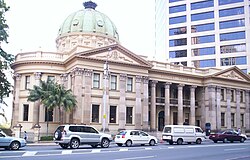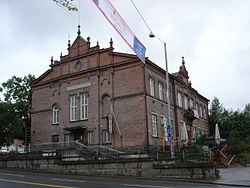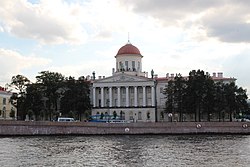


A custom house or customs house was traditionally a building housing the offices for a jurisdictional government whose officials oversaw the functions associated with importing and exporting goods into and out of a country, such as collecting customs duty on imported goods. A custom house was typically located in a seaport or in a city on a major river, with access to an ocean. These cities acted as ports of entry into a country.
Due to advances in electronic information systems, the increased volume of international trade, and the introduction of air travel, the term "custom house" became a historical anachronism. There are many examples of buildings around the world that were formerly used as custom houses but have since been converted for other uses, such as museums or civic buildings.
As examples, the former Alexander Hamilton U.S. Custom House in Manhattan, New York, (now the George Gustav Heye Center) presently houses a branch of the National Museum of the American Indian, the former U.S. Custom House in New Orleans, Louisiana, is now home to the Audubon Butterfly Garden and Insectarium, the former U.S. Custom House in San Francisco, California, now houses offices of the U.S. Customs and Border Protection and Social Security Administration and the former U.S. Custom House in Baltimore, Maryland, was in 1973 serving as a Selective Service office. As of 2019, the Custom House of Valletta in Malta was still being used for its original purpose.
History
Custom Houses became a prominent feature of English ports after 1275, following the creation of a national system for collecting duties on overseas trade.

In the United Kingdom, since 1386, the phrase "custom house" has been in use over the term "customs house". This was after the City of London's Custom House was erected at Wool Wharf in Tower Ward, to house just the officials overseeing the Great Custom on Wool and Woolfells. The singular form was used even though in later years the City of London's Custom House served as the workplace for other customs officials as well.
See also
References
- (1) "National Museum of the American Indian & U.S. Custom House". New York, NY: New York Landmarks Conservancy. 23 January 2013. Archived from the original on November 24, 2020. Retrieved April 16, 2021.
(2) "Engaging with Nature - Insectarium at the Audubon Nature Institute" (PDF). Themed Entertainment Association. p. 12. Archived from the original (PDF) on December 21, 2010. Retrieved June 30, 2012.
(3) "US Custom House - San Francisco". United States General Services Administration. March 3, 2021. Archived from the original on March 22, 2021. Retrieved April 18, 2021.Major tenants are U.S. Customs and Border Protection and SSA's Office of Disability Adjudication and Review
(4) Milner, John D., National Heritage Corporation (June 22, 1973). "United States Custom House". United States Department of the Interior: National Park Service: National Register of Historic Places Inventory – Nomination Form for Federal Properties. National Park Service. Retrieved April 16, 2021.{{cite web}}: CS1 maint: multiple names: authors list (link) - (1) Borg, Joseph (1974). "The Custom House - Malta" (PDF). Scientia. 2 (2): 59–63.
(2) Joseph Borg K.M., Ph.C., L.P. (1974). Victor H. Sammut B.Sc. (ed.). "Our History". Scientia: The Custom House.{{cite web}}: CS1 maint: multiple names: authors list (link) - N. S. B. Gras, The early English customs system; a documentary study of the institutional and economical history of the customs from the thirteenth to the sixteenth century (Harvard, 1918), pp. 94-103
- Smith, Graham (1980). Something To Declare. London: Harrap & Co. Ltd. p. 6. ISBN 0-245-53472-5.
External links
- "U.S. Custom House, Philadelphia, PA". General Services Administration.
- "Custom House, Leith" (PDF). Scottish Historic Buildings Trust. Archived from the original (PDF) on 2020-03-17. Retrieved 2020-03-17.